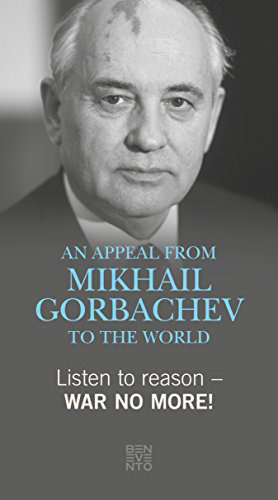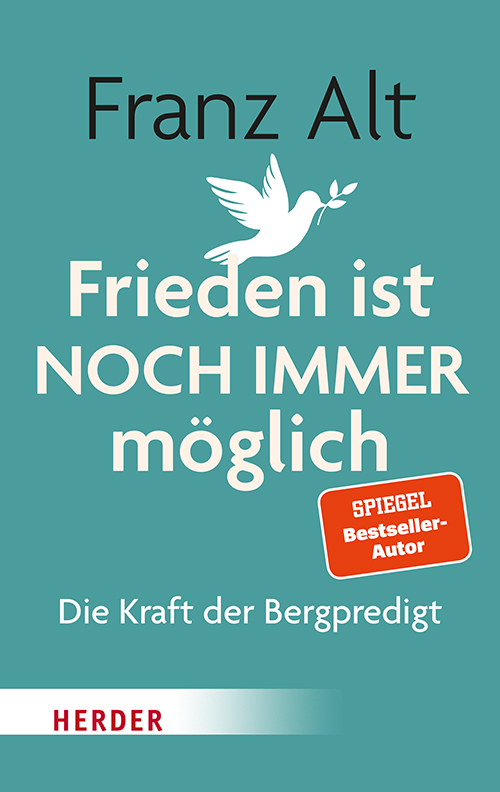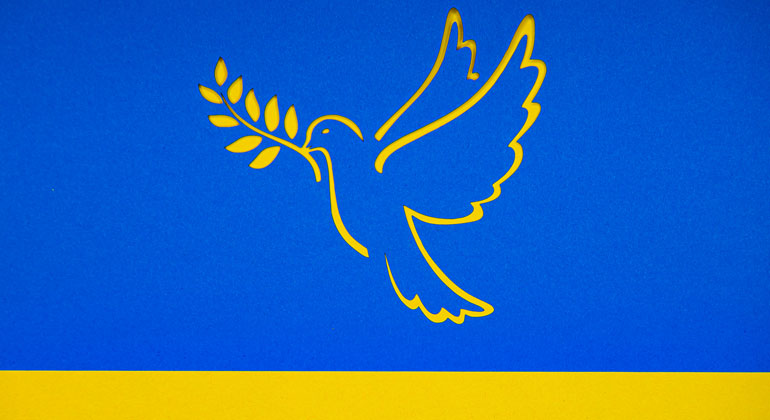Is peace still possible?
Is peace still possible even now in the midst of war? This is what many people are asking themselves at Christmas 2022. Does Jesus’ Sermon on the Mount show a way to peace even in our time? Can the power of the Sermon on the Mount help? The Christmas Commentary by Franz Alt
For more than 2000 years, the ancient Roman principle “He who wants peace must prepare war” – (“Si vis pacem, para bellum”) – has been valid all over the world. Result: 2000 years of repeated wars, mass murder, immeasurable human misery and suffering, brutal destruction and millions of people on the run. In the same spirit, the defense ministers of all NATO countries keep demanding: “More money for the military”.
To this day, we are stuck in the war trap that whispers to us: “Create peace with more and more weapons.” In 2022, Germany decided to set up a special military fund of 100 billion euros. The USA, Russia and China are spending record sums on the military and “modernizing” their nuclear arsenals, their weapons of mass destruction. Can a peaceful world really come into being in this way? Is peace possible in this way?
The alternative is: If you want peace, you have to prepare peace.
Where this unreflective policy leads, we have seen most recently in Afghanistan. The West failed there because it once again wanted to win a war, but not peace. Today, Afghanistan is a graveyard of the great powers. But still the next wars are being prepared.
What and how would be a new culture of peace instead of the old logic of war? What could the alternative look like? How about the motto “Who wants peace, must prepare peace”? And how would that work concretely and practically?
In Europe today, we would need a lot of money for railways and schools, for climate protection and daycare centers and for many social housing units, for overcoming poverty and even more for overcoming the injustice between South and North. Just like almost all other countries. So money for civil security policy. How do we move from the current spiral of constant rearmament to a policy of disarmament?
A new policy begins with new thinking

More than 35 years ago, Mikhail Gorbachev successfully demonstrated to us that disarmament is also possible, a real politician with vision. Because someone had the courage to go forward and to rely on realizable visions in an environment of hardliners, entire weapons systems could simply be scrapped for the first time in human history. Controlled scrapping. There was actually disarmament instead of rearmament. Europe became safer, the Wall fell and peaceful German unification became possible.
And how does it look today, after the old madness of the nuclear arms race has just started all over again? No Gorbachev far and wide. But again thinking in the old logic of war. Rising arms budgets everywhere. Were we only capable of learning in the short term? Do we really have no other worries than to rearm again? This could lead to a third world war and into the nuclear abyss. We still want to overcome our own fear by spreading fear to others. This is the madness of the new arms race. 100 billion in special funds for the Bundeswehr – Russia threatens nuclear war and spends half of its gross national product on armaments and rearmament; Japan doubles its military expenditures; the U.S. affords three times as much military expenditures as Russia and China together. But every year we let millions of people starve to death. This cannot be good in the long run.
There are always alternatives

What would be a nuclear war, I once asked the expert Gorbachev. His answer: “A nuclear war would probably be the last war in the history of mankind, because afterwards there would be no more people who could still wage war. Let’s finally stop this madness.” We wrote a joint book about this in 2017, “Never again war – come to your senses at last!” It became Gorbi’s legacy.
My history with Mikhail Gorbachev began in the mid-eighties. I had published the book “Peace is Possible – The Politics of the Sermon on the Mount”. After that, I met a Russian general who was Gorbachev’s security advisor in the Kremlin. He told me, “Gorbachev had her book translated into Russian. We will now make a policy in the Soviet Union in the spirit of the Sermon on the Mount and simply stop the arms race because it no longer makes sense and is dangerous.”
That was actually my suggestion in my Sermon on the Mount book: someone has to start stopping. Jesus’ love of enemies does not mean: let everything be offered to you, but quite realistically: take the first step toward the other. In fact, “Gorbi” became the greatest disarmamentist of all time, paving the way for peaceful German unity, ending the Cold War and changing the world for the better. Eighty percent of all nuclear weapons were scrapped. The main threat of nuclear war had been eliminated. “How was that possible?” I later wanted to know from him. “Only through trust, which I was able to build with then U.S. President Reagan,” was his answer. Now Mikhail Gorbachev has died.
Thou shalt not kill
In our common book he says: “We are one humanity on one earth under one sun”. Real peace, he says, “can only be achieved under the condition of demilitarized politics and demilitarized international relations. Politicians who think that problems and disputes can be solved by the use of military force – even as a last resort – should be rejected by society, they should clear the political stage.” No wonder Gorbachev and Putin could never become friends. Shortly before his death, Gorbachev sent me an article for the newspaper Russia Global Affairs. He named as the most urgent problems of our time: the abolition of nuclear weapons and the overcoming of mass poverty in developing countries, as well as saving the world’s climate.
The basic ethic of all religions and wisdom teachings is: “Thou shalt not kill. But this also means “Thou shalt not let kill”, if you can prevent it. Therefore, in the case of the mass murder in Rwanda in 1994, it would have been necessary and morally right if the UN soldiers present had tried to prevent the mass murder – even with weapons.
Escalation or failure to provide assistance?
Who is now right in Germany in 2022: those who are in favor of supplying weapons to Ukraine or those who are against it? I don’t know. Nobody knows for sure. Both sides can be guilty. Every decision has its dark side. Every decision claims human lives. Every decision makes guilty. The supporters of arms deliveries cannot rule out that they contribute to further escalation. And the opponents of arms deliveries, however, also cannot rule out the possibility that they are guilty of failing to provide assistance. We are divided on this issue. But we should listen to each other right now. There is also a culture of doubt and thoughtfulness. I am glad that Germany now has a chancellor who supplies weapons, but does so only hesitantly. Hesitation and hesitation seem to me wiser in times of war than brash escalation. We must learn that real security is also always the security of the adversary.
In these months, Pope Francis has also expressed doubts about arms deliveries from outside, but at the same time underlined the right of every country to defend itself. However, every real pacifist must ask himself how Ukraine is supposed to defend itself without weapons in this war of annihilation by Putin. Perhaps we now need a detour “creating peace with weapons” to achieve the long-term goal “creating peace without weapons”. That would be a differentiated pacifism. The fact is: German defensive missiles have saved the lives of many Ukrainians in recent weeks.
No pacifism in the sense of the aggressor
But there is one thing we should always remember – whichever side we are on: It is always the people in Ukraine who are affected first. Their young men are killed, their women are raped, their children and their old people are forced to flee. German know-it-all attitude is out of the question. So German pacifism cannot mean that we can recommend to the Ukrainians from the safe ground of our country: Please surrender! That would be pacifism in the sense of the aggressor. It would be a “pacifism” that still holds the door open for the aggressor. What is often forgotten: Even the German original pacifist Bertha von Suttner considered defensive wars legitimate. And the most famous German pacifist Albert Einstein differentiated between “reasonable pacifism” and “irresponsible pacifism”. Today I distinguish between real pacifism and fundamental pacifism.
The Sermon on the Mount: The Survival Program of Mankind
With over 700 billion dollars per year for the military, the USA is still the strongest military power in the world. That is why they should start disarmament steps right now, so that the others will follow. Disarmament succeeds when the strongest starts. Only fewer weapons bring more security for all.
Jesus recommended “love your enemies” in his Sermon on the Mount. Is that naive? Was Jesus a nutcase?
Love of enemies does not mean: Let yourself be offered everything. It means: Be smarter than your enemy. Have the courage to take the first step. The Sermon on the Mount, as Gorbachev once told me, “is the survival program of mankind in the nuclear age.
After all, Helmut Kohl made this proposal: “Create peace with fewer and fewer weapons”. So disarm instead of rearm. May today’s NATO defense ministers, mostly Christians, still be reminded of Jesus and Helmut Kohl? Or even the Sermon on the Mount by Mikhail Gorbachev? The goal would then be – perhaps by 2040 – to create peace without weapons. Let us think of security in a completely new way. You can make politics with the Sermon on the Mount, dear Christians in politics! Real peace policy. The Sermon on the Mount is a message of joy and not a threatening message. Jesus was a realist.
New ways are possible

And to those who say that you cannot govern with the Sermon on the Mount, my counter-question: Have you ever tried it? Gorbachev showed us how. And he did it successfully. Chancellor Scholz just said in an interview with the Süddeutsche Zeitung that he wants to maintain contact with Putin in 2023 and seek peace negotiations. There are two events from the last weeks that show that even now negotiations can be better and more successful than further escalation: Russia and Ukraine have concluded the Wheat Agreement under the chairmanship of the United Nations and both sides have also successfully organized a prisoner exchange. A precondition for peace in Ukraine is a rapid cease-fire.
Just now, the successful conclusion of the World Conference on Nature has also shown that new thinking and action are possible in both business and politics. There are always alternatives. My crown witnesses for this realistic assessment at Christmas 2022 are Jesus and his Sermon on the Mount, the disarmament policy of Mikhail Gorbachev and the teaching of non-violence of my long-time friend, the Dalai Lama. All problems that humans have created are also solvable by humans.
- His new book has just been published by Herder-Verlag: „Frieden ist noch immer möglich – Die Kraft der Bergpredigt„.
- Mikhail Gorbachev “Listen to reason – War no more!: An Appeal from Mikhail Gorbachev to the world” (English Edition)
- Mikhail Gorbachev “An Appeal from Mikhail Gorbachev to the world” – (Russian Edition)
Source
Franz Alt 2022 | Translated with www.DeepL.com/Translator (free version)








